HIT CHANNEL EXCLUSIVE INTERVIEW: April 2024. We had the great honour to talk with one of the greatest drummers of all time: Simon Kirke. He is best known as a founding member of Free and Bad Company, two of the best bands of the ‘70s. He has also played with Ringo Starr & His All-Starr Band, Led Zeppelin, Jon Lord, Keith Emerson. As a solo artist, he has released three albums. In 2017, he released his latest solo effort called “All Because of You”. Read below the very interesting things he told us:
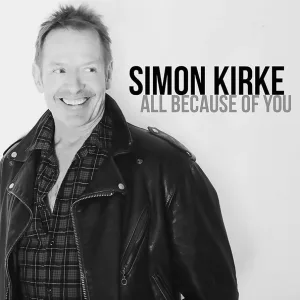 I know that you will participate in Rock ‘N’ Roll Fantasy Camp in July. What are the projects you are currently involved with?
I know that you will participate in Rock ‘N’ Roll Fantasy Camp in July. What are the projects you are currently involved with?
Ok. Wow, you are very well-informed, my friend. Yes, I do this. I ‘ve done many-many fantasy camps over the years, I’m on the Board, you know, but also right now I’m writing a rock opera about addiction and drug use. It’s called “Rock Bottom” and it’s gonna be very-very good. We ‘ve written about 14 songs and me and two other guys have written the script. That’s my main thing right now. I do solo shows and play occasional shows with a guitarist, but mainly my live career… I had a very good run, let’s say.
Will there be any guest musicians in the rock opera, because you know everybody?
Well, I know a few people, yeah. I’ve asked a friend of mine, Sting, he is a good friend and he had his own musical a couple of years ago called “The Last Ship” and he warned me that the theatre it’s a hard, very difficult business to become involved with. It’s nothing like rock ‘n’ roll, it’s nothing like making an album, it’s nothing like touring. The world of theatre is very slow, very expensive and if you are lucky and it’s a hit, then good, but be prepared, it’s a long road, as we say.
Could you please give us some basic information about your latest solo album, “All Because of You” (2017)?
Well, it’s been out a few years now. I recorded it in Chicago with a very good band who are friends of mine, called The Empty Pockets. I have all these songs, until they are out of my world, they collect dust. I like to record them and put them out to make room for new songs. I ‘ve recorded now three solo albums and I like them all. But “All Because of You” was written because I remarried, I got a wonderful new wife, Maria, and there is a song called “Maria” and there is a couple of other songs written for her and I’ve very pleased with it. I think it’s a very good album.
In your solo shows you like to perform in front of the stage with a guitar in your hands. What influenced you to do this?
I’ve been playing guitar as long as I’ve been playing drums. I ‘ve been playing drums for 60 years and I play guitar for another 60 years, so it’s a very natural instrument for me and I play piano, too. So, in my solo shows I do songs from Free, Bad Company, some of my own songs and I play guitar and piano and if I have a band with me, obviously I play drums because they want to hear “All Right Now”. They love to hear “All Right Now”, so I have to play it.
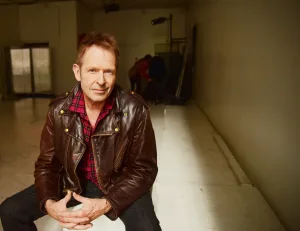 How much did Alexis Korner help the formation of Free?
How much did Alexis Korner help the formation of Free?
Another Greek man, Alexis was from Greece! Yeah, his mother was from Greece. We called him “The Godfather of the Blues” in England. There were three people in the mid 1960s who were important to make the blues rise in England: Alexis Korner, John Mayall and Cyril Davies. Cyril Davies played harp. Those three were very-very important for the blues scene. Alexis Korner helped Free, my first band to come together and he thought of the name “Free”. We did our very first tour with him all over England. He was a very important man in our beginning career.
Were you surprised with Paul Kossoff’s playing in “All Right Now” (from “Fire and Water” album – 1970) song?
Oh, it was one of the best guitar solos ever! You know, I played “All Right Now” hundreds and hundreds of times with different guitarists. Peter Frampton, when I was with Ringo, came very close to playing what Paul Kossoff played, but no one has played that solo the way Paul Kossoff did. Remember, in 1970 when we recorded it, Paul was just 20 years old. Before he became ill with drugs, he was the most incredible guitar player that I ever worked with. So, he was a wonderful guitarist.
In your opinion, what was the greatest skill that Paul Kossoff had?
Let me think, ok, I will tell you a story. When we toured with Blind Faith, you know, Blind Faith were amazing! Amazing! Clapton was only 24 years old, very young. After one show he came into the dressing room. We were wiping the sweat and our road manager said: “Eric Clapton wants to come in” and we said: “Bring him in” and he went straight to Paul and he said: “How do you do that vibrato with the left hand?” and Koss -we called him “Koss”- looked at Eric and said: “You gotta be fucking kidding me?! You are asking me?!” and he said: “Yeah. How do you do it? It’s so slow”. I remember it 54 years later. I remember Kossoff’s expression on his face (ed: he mimics Kossoff’s surprise on Zoom). So, that was his amazing skill: It was this incredible slow vibrato.
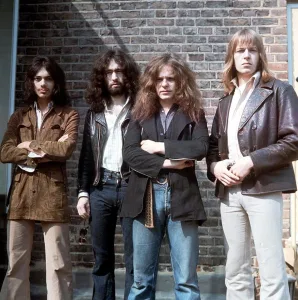 What memories do you have from the Isle of Wight Festival in 1970?
What memories do you have from the Isle of Wight Festival in 1970?
Sheer fear. Terror. Frightened. Well, I remember it very-very well because it was such a big part of my career. The first memory I have is flying in a helicopter over the concert and to see what I thought from 5.000 meters up; it looked like a giant carpet of insects that were moving and of course it was 500.000 people and this tiny little square at the end, which was the stage. We got there and I remember the pilot saying: “That’s where you are playing” and we said: “What?!” You know, we didn’t play the first night. We were due to play but it was so crazy that it get more and more later, more and more later, we were drinking, we were smoking… By the time we were supposed to go on maybe at 8 in the evening our manager said: “No. You are not going on. It’s crazy. You are gonna go on the next morning, Sunday morning”. We went on about 1:00 in the afternoon and it was beautiful. We had clear heads and we played great. But I remember going out there and seeing this enormous crowd and yeah, we were pretty scared. We never played anything like that ever. The next day we were on the front page of the newspapers, it was a big triumph for us. Yeah.
I love your playing in “Stealer” from “Highway” (1970) album. Could you describe to us your approach to this?
(Laughs) “Stealer” was following up “All Right Now” which is a very difficult song to follow because “All Right Now” had the “Dun/ tu-tu-tu/ tu-tu pa-pa/ papa”. It was a good rock ‘n’ roll song. Now “Stealer” was a little different because you couldn’t really dance to it. “Da-ga-daaaowww/ da-daow/ da-daow/ da-ga-daaaoww/ da-daow/ BA-boukb BA-koumb/ tu-du-tun/ tu-ku-dun-dun”. You could nod your head to it instead of dance. I loved it! I thought it was so interesting to play and quite difficult. But it built; it got bigger and bigger and bigger towards the end but it was not a hit. It was not commercial and it’s a shame because it was one of the best songs Free ever recorded, I think. Instead of doing: “TS-TS-TS, 1-2-3-4-5-6-7-8. 1-2-3…” what we called eights on the hi-hat, I was doing fours (ed: slower) : “1, 2, 3, 4 and 1, 2, TS, TS”. It gives more breath to the drums when you only do: “pa pa” instead of (ed: faster) “pa-pa-pa-pa”. It makes it breathe more. So, I found that pretty quickly maybe after the second rehearsal of the song, I thought: “Oh, that’s not right” and I went to what we call fours on the hi-hat and it really helped make the song breathe which is what we wanted.
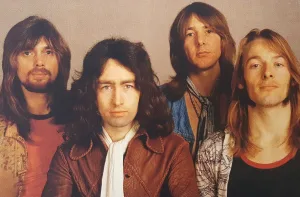 How emotional was it to for you play the final concert in Sydney, Australia before the first break up of Free?
How emotional was it to for you play the final concert in Sydney, Australia before the first break up of Free?
Oh, you’ve done your homework, Theo (laughs). It was sad because I ‘ll tell you what happened: Before we flew to Japan and Australia where the final show was, me and Paul Kossoff had no idea that Paul Rodgers (vocals) and Andy (ed: Fraser -bass) wanted to break up the band. So, it was a big shock when they said after these two tours, Japan and Australia: “We are gonna quit”. We said: “What?! Are you crazy?” So, that was it. We flew to Japan, we had a big success there and I think we did four, maybe five shows in Australia and the last show was the Randwick Racecourse in Sydney. There was a lot of tension, a lot of nervousness and quite honestly I was sad, but I was glad we were going our own ways because it was like a bad marriage, we didn’t like each other. I’ll never forget the final show. Listen to this: So, after the show we are coming down the steps to go back into the cars to take us to the hotel and as we were coming down one guy shouts out to us: “Hey you, guys, that was a great show. I saw you in Chester, in England, with Alexis Korner, your very first show”. We said: “What?!” So, this guy, he was from England, he now lived in Australia, he saw the first show of Free and the last show of Free (laughs). I ‘ll never forget that. But, it was a sad day. It was sad, yeah.
I really respect Free because they never reunited after Paul Kossoff’s death. What made you turning down all the offers for a reunion?
After the second time (ed: they reunited with Kossoff), we realised that Paul had a very bad drug problem and back then, over 50 years ago, the concept of addiction was not so well-known like it is today. A lot of people now, I mean, take me, I say I ‘m an addict, I’m an alcoholic, I don’t drink, I don’t take drugs anymore. But if you said that 50 years ago, oh, you were a bad person, etc. So, the thing with Paul Kossoff is that we kept trying to make the music be his doctor. We tried to stay together for him when really he needed treatment, he needed to go to hospital, he needed to go to rehab and so on. So, by the time 1973 came around we were just fed up with him, with the whole thing and me and Paul Rodgers went our own way and a few months later we got back together and formed Bad Company. So, the reason that we didn’t continue Free was it was such a pain in the ass (laughs).
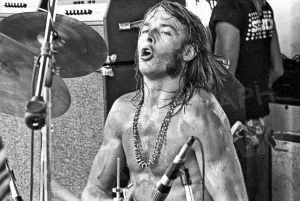 The song “Bad Company” is co-written by you and Paul Rodgers. Would you like to tell us a few words about this great song?
The song “Bad Company” is co-written by you and Paul Rodgers. Would you like to tell us a few words about this great song?
Yeah, it’s a good story. Back in 1973 when we wrote it, there was what they called “Spaghetti Westerns”. Clint Eastwood, “A Fistful of Dollars” (1964), the bad men riding across the plains on horses and looking for outlaws and so on, and Paul Rodgers had this idea on the piano and I ‘ll never forget: I went to his house and he just bought this big piano and he was playing this little thing on the piano. I said: “Wow, that’s great!” He said: “I got this line: ‘Company always on the run’” and I went: “Destiny is the rising sun” and he said: “Ah! Ok, that will work”. So, it took us about 20 minutes to write that song and it became the name of the band, it became the name of the album, it became one of our biggest hits. It’s funny, 20 minutes around the piano.
Did you get on well with Peter Grant (Led Zeppelin manager) when Band Company were signed to Swan Song Records?
(Laughs) I did. Ah, it’s a long story with Peter Grant. I mean, I was scared of him, but he was like a father to me, even though he was quite young. A lot of people don’t know that Peter was born in 1935, he was quite young, but he was a big guy, he was a wrestler, you know. So, in a bad mood you didn’t want to be near him, because he was scary. But I got on very well with him and he was a very good manager. He really looked after us. Look, he had the biggest band in the world, Led Zeppelin, they formed this wonderful record company, Swan Song and we were the first band to be on the label apart from Led Zeppelin. He looked after us, he did a very good job with us and I’ll never forget him.
Jimmy Page was very supportive of Bad Company. Did you have fun when he joined you on stage at Central Park in New York in 1974?
He joined us twice. He came on in New York and he came on in Dallas and I’ll never forget in the dressing room before New York, I said to Jimmy: “Are you gonna come up and play?” and he said: “No, no, no. This is your night, this is your show. You don’t want me around”. I said: “Ok” and then at the end of the show he gets up and he is plugging in his guitar and I said: “Hey Jimmy, I thought you are not gonna come up”. He said: “You guys are so fucking good, I just have to come up and joining you”. I said: “Great, let’s go!” He was very supportive. We were his band, in a way. We were the first band on his label and he flew to quite a few shows to see us. He never offered advice. Just the fact that Jimmy Page was there was a big deal for us and we were very grateful. He played, I believe, “Crossroads”, the old Cream/Robert Johnson song.
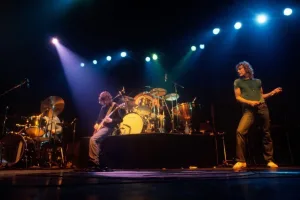
Υοu played “Whole Lotta Love” with Led Zeppelin in Munich in 1980. Do you consider it one of the highlights of your career?
Oh yeah, yeah. The great story behind that was: I went on tour with Zeppelin, I went to two or three of their shows, the last tour, unfortunately, before Bonzo (ed: Bonham’s nickname) died and the day before Munich Bonzo said to me: “Hey, if I get another drum kit, are you gonna come up and play ‘Whole Lotta Love’” ? I said: “I ‘d love to, man”. So, he said: “Come tomorrow afternoon when I ‘ll rehearse it” and I thought he was gonna get a big studio with two drum kits to practice. No, no, no. I went to his hotel and I went up to his suite and there were twin beds, it was a little suite. Two beds, I sat on one, he sat on the other and we were facing each other and we were banging on our legs and he said to me: “It starts like: ‘Ba-ba Ba-ba, pampt-K/ papa pam/ pam’” and I said: “Yeah, I think I know the riff” and then he said: “Well, it goes on and on for like 20 minutes, so there is a stop: (ed: drums) ‘Ba-Ba’ (ed: guitar’s answer follows) ‘dililili-liloli’ (ed: drums again) ‘Ba-Ba’”. So, basically, Theo, we went through the whole of “Whole Lotta Love” sitting in this little hotel room facing each other on beds banging on our legs and that’s how we did it. It was great.
Within a 3-month period in 1980, music lost John Bonham and John Lennon. How much did their deaths affect you on a personal level?
Big time. The last period in 1980 was horrible. When I heard that Bonzo died I said: “Aaah! Wow!” I was stunned because he was a friend of mine and it was a horrible time. Then, December 8th Lennon got shot, I said: “Oh my God!” It was the worst. When Bonzo died that was the end of Zeppelin, I mean, they could not continue and I ‘m glad they didn’t with another drummer, because Bonzo was so important to the band. There is no other drummer like him. There are a few people nowadays who I would consider: His son, Jason, is the most incredible drummer. I think he could have replaced John. But you ‘ve got to remember that Bonzo was Robert Plant’s best friend ever and when Bonzo died, Robert was like completely destroyed. He said: “I don’t wanna play without Bonzo” and fine, that was good. Then, Lennon being killed like that it was the final punch in the face. It was terrible time.
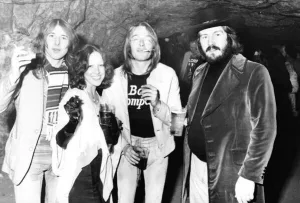
I’ve heard some rumours that before Led Zeppelin decide to stop, you were considered as John Bonham’s replacement; you and Bev Bevan (ELO, The Move, Black Sabbath).
Yeah, you know your stuff. Yeah, I heard that as well. There were quite a few rumours, I was never approached. Bad Company was still active, so I couldn’t have done it. Like I said, I don’t know anyone back then that could have replaced Bonzo. Bev… hmm (ed: he expresses doubt), I don’t think so. Bev was from the same town, Birmingham, but I really don’t think Bev had the chops. Bonzo was a really special drummer. Really special. I think nowadays Danny Carey from Tool could have done it. Danny Carey is a great drummer; heavy. Jason, there are two or three guys now who could have done the job but back then, no. I don’t think anyone could have replaced him.
You toured for three years with Ringo Starr & His All-Starr Band. Was it a bit surreal to be in the same band with Ringo?
(Laughs) It was a bit because Ringo is a big influence on me. I soon recovered from that; after the first time we met in LA, to sit on my drums and to look on my right and see him there on his drums that was a little weird, but it wasn’t like playing with Bonzo: Bonzo was (ed: he shows heavy drumming on Zoom) “Dup/tu-pup-dap/dup”. Ringo was (ed: he shows softer drumming) “dup…dup”, you know, very smooth and cool. So, I managed to play alongside Ringo well and you ‘ve got to remember that there were so wonderful musicians in Ringo’s bands: Peter Frampton, Jack Bruce (Cream -bass, vocals), Gary Brooker (Procol Harum -keyboards), Mark Rivera (Billy Joel -saxophone, vocals, keyboards). The first band was a wonderful band but I ‘ve got to say: At times, I had to pinch myself to realise I’m playing with one of my heroes.
One of my favourite Youtube videos ever is All-Starr Band playing “Sunshine of Your Love” with Jack Bruce and Peter Frampton. Was it an interesting experience to play that song with those people?
Yeah, you know, “Sunshine” a tough song to play and the fact that I am playing with Jack Bruce, who I think was one of the best bass players I ever played with; he was so good. But the great thing about Jack was that he could play “Sunshine of Your Love” and then five minutes later play “Yellow Submarine”. He was just an amazing player. But “Sunshine of Your Love” is a tough song to play and I’ll say again that Peter Frampton was a wonderful guitarist and he played Eric Clapton’s parts so well. Yeah, it was great.
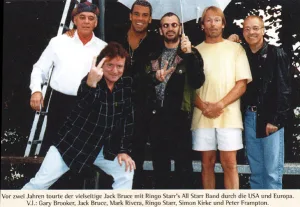 You are featuring in the incredible documentary about Ginger Baker (Cream, Blind Faith -drums, “Beware of Mr. Baker” (2012). How important was his influence on you as a drummer?
You are featuring in the incredible documentary about Ginger Baker (Cream, Blind Faith -drums, “Beware of Mr. Baker” (2012). How important was his influence on you as a drummer?
Not so much, I ‘ll be honest. Ginger was an amazing drummer for his incorporation of African rhythms. But my influences were Al Jackson (Booker T. and the M.G.’s), the Motown drummers, soul drummers, you know, black drummers; they were my main inspiration. I remember seeing Ginger many times because he was in Blind Faith and his drum solos were wonderful, but I’ll be honest his actual playing was not that much of an influence on me, but his showmanship, his ability to project. He had a big kit too: Two bass drums, two tom-toms, two floor tom-toms, he had a very big kit. He was a real character, I have to tell you, yeah.
Did you have fun performing with Keith Emerson (Emerson Lake & Palmer, The Nice -keyboards), Chris Squire (Yes -bass) and Alan White (Yes, John Lennon -drums) at the Ahmet Ertegun Tribute Concert in 2007, opening for Led Zeppelin?
Yeah, of my God! It’s hard to believe that three of those guys are now dead: Chris, Alan White and Keith. Once again, I flew over from New York, the limousine met me, it took me to what I thought was a rehearsal. It was Chris Squire’s apartment and there was Keith with a tiny Casio keyboard, like three octaves; Keith Emerson! Chris had his bass with no amp and there is me, once again, like Bonzo, banging on my legs. I said: “This is it?! This is the rehearsal?!” They said: “Yeah-yeah!” So, we went through “Fanfare for the Common Man”, Aaron Copland’s song and I’m thinking: “I must be dreaming. I ‘m with Keith Emerson and Chris Squire playing this children’s toys and we are gonna be at the O2 Arena in two nights”, but it worked great. That was the last time I saw Keith and Chris.
Keith Emerson told me: “Music in the ‘60s was more important to people. It was a huge event when The Beatles had a new album out. You should listen to John Lennon’s lyrics, you should listen to Paul McCartney’s bass. Nowadays, nobody gives a shit about who the guitar soloist is on a Lady Gaga album”. Do you agree with this?
Wow! I do. Look, computers are like a sword with two edges, it cuts both ways. The Internet is the most incredible device, I think since the invention of the car. I couldn’t talk to you in Athens from New York without this Internet, but it makes music disposable. People listen for maybe 20 seconds and go to somewhere else: They go to Youtube, they go to TikTok, they go to Snapchat, Amazon Music and Apple Music. So, there are millions and millions of songs whereas 60 years ago, like Keith said The Beatles were releasing an album, you ‘d get it and you ‘d open it up, you looked at the lyrics, you looked who played what, when it was recorded, it became like a little Bible, encyclopedia. Then, the Rolling Stones they ‘d bring out an album next. It was more special back in those days. Hey, there is nothing we can do about it, it’s just progress. But I agree 100% with what Keith said. It was so true.
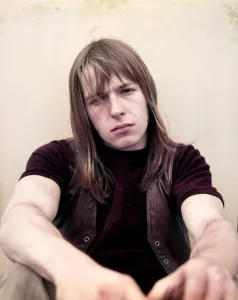 In Ginger Baker’s documentary, Ginger said that John Bonham “couldn’t swing a sack of shit”. Do you agree with this?
In Ginger Baker’s documentary, Ginger said that John Bonham “couldn’t swing a sack of shit”. Do you agree with this?
(Laughs) No, I don’t agree with it. I don’t agree with it. Bonzo was a great drummer. Ginger was a miserable son of a bitch (laughs). I think Eric said the same thing. Someone compared Bonzo to Ginger and Bonzo was better than Ginger and Eric said: “No, no, no”. Look, Ginger was a jazz drummer, he was a purist. Eric was a blues guitarist, a purist, back in those days. So, along comes Bonzo, very young, you ‘ve got to remember Bonzo was born in 1948, so when Zeppelin came on in ’69, he was 21 years old and here is this guy doing things that no one drummer had done before. I think there was a little jealousy from Ginger, but Ginger was a jazz drummer and a lot of jazz musicians look down on rock musicians. Ginger, like I said, was a miserable bugger and I don’t think he liked Bonzo one bit, but I don’t think Bonzo liked Ginger much either, so there you go.
The other day I realized that you shared drum duties on an album with Cozy Powell (Rainbow, Black Sabbath, The Jeff Beck Group) : Jon Lord’s “Before I Forget” (1982). Did you like Cozy’s style as a drummer?
You know, I never got to meet Cozy. I did like him. I liked his style and Jeff Beck said a great thing before sadly he died. He said: “Cozy is one of the best drummers I have ever worked with”. Cozy was similar to Bonzo, but he had a little bit more speciality, he was heavy but he was more musical and Jeff was not an easy guitarist to play with, but him and Cozy were a very good combination. But I never got to meet him! Very good drummer.
Had you ever meet Keith Moon?
I met Keith a couple of times. A lunatic! A lunatic! I love Keith, my God! What we say: “He is one-man-army of destruction”. He was friends of Richard Cole; Richard Cole was Led Zeppelin’s tour manager. When I went to see Richard and I walked into his apartment, Richard said: “You ‘ll never guess who is here: Keith Moon”. I said: “Oh, fuck! Great!” He gave me a hug, etc and they were playing “Who Are You”: “Whooo Are You/ PA pa/ PA pa” and the drumming was amazing. Keith, oh dear, was sorting out some powder and I thought it was coke and I went to have some and he said: “Stop! It’s heroine” and I said: Oh, fucking no. I don’t want. Keith, do you do heroine?” and he said (ed: he mimics his voice) : “Occasionally”. When you mention Keith to people it’s a mixture of love because he was like a big child, but he was an incredible drummer, completely unique and he never had a mean bone in his body, he was just a lovable lunatic. Look at me, look at my face, I’m smiling because I remember him so well.
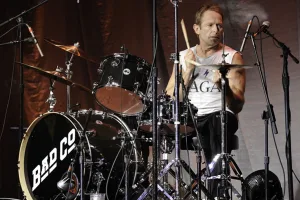 How did you feel when Paul Rodgers played with Queen?
How did you feel when Paul Rodgers played with Queen?
Oh, I was happy for him. We had an up and down relationship, me and Paul, and I was a little: “Hmm (ed: pensive), replacing Freddie Mercury?! Wow! Ok” and a lot of people thought the same thing, but you ‘ve got to remember that it was just another musical path for both Queen and Paul. Paul gave Queen a sort of bluesy rock edge away from Freddie’s theatrical, operatic style and it worked. They were together four years and they went all over the world. I went to see them in Long Island, in New York and they were great. They didn’t do “Bohemian Rhapsody” though. It was too difficult. But they did “We Will Rock You”, they did all the Queen hits and Paul did a great job.
Who is the most talented musician you have ever seen?
I mean, there are a lot of people. If I had more time to think, I would try to be clever. Off the top of my head, Paul McCartney is pretty talented: He plays guitar, drums, he plays amazing bass, a great singer and a great songwriter. I think he would be my first choice.
A huge “THANK YOU” to Mr. Simon Kirke for his time. I should also thank Mrs. Maria Angelica Kirke for her valuable help.
Simon Kirke Official Website: https://officialsimonkirke.com/
Simon Kirke Official Facebook page: https://www.facebook.com/SimonKirkeOfficial/

